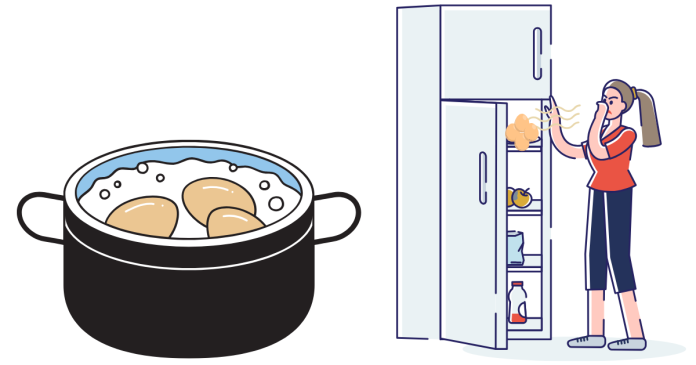Hard-boiled eggs are a popular, protein-packed snack that’s convenient and easy to prepare. But how long can you store them in the refrigerator before they spoil? Let’s break down the longevity of refrigerated hard-boiled eggs, how to store them properly, and how to tell if they’re still safe to eat.
How Long Do Hard-Boiled Eggs Last in the Refrigerator?
The lifespan of hard-boiled eggs depends on whether they are stored with or without their shells:
- With the Shell On:
- Hard-boiled eggs can last up to 7 days in the refrigerator when the shell is intact.
- The shell acts as a natural barrier, protecting the egg from bacteria and moisture loss, which helps preserve freshness.
- Peeled Hard-Boiled Eggs:
- Once peeled, hard-boiled eggs should be consumed within 2–3 days.
- Without the shell, eggs are more exposed to air and bacteria, which shortens their shelf life.
Why Do Hard-Boiled Eggs Spoil?
Hard-boiled eggs spoil due to exposure to bacteria and air. Unlike raw eggs, which have a protective layer called the “bloom,” boiling removes this coating, making them more vulnerable to spoilage. Proper storage in the refrigerator is essential to prevent bacteria growth.
How to Store Hard-Boiled Eggs Properly
To maximize the longevity of your hard-boiled eggs, follow these tips:
- Leave the Shell On:
If you don’t plan to eat them right away, store hard-boiled eggs with their shells intact. This helps retain moisture and keeps bacteria out. - Use an Airtight Container:
For peeled eggs, store them in an airtight container to minimize air exposure. You can line the container with a damp paper towel to prevent the eggs from drying out. - Refrigerate Promptly:
After boiling, cool the eggs in an ice bath to stop the cooking process, then refrigerate them within 2 hours. - Label the Eggs:
Mark the date on the container or egg carton to keep track of how long they’ve been stored.
How to Tell if Refrigerated Hard-Boiled Eggs Have Gone Bad
Even when refrigerated, hard-boiled eggs can eventually spoil. Here’s how to identify if they’re no longer safe to eat:
- Unpleasant Odor:
A strong, sour, or sulfur-like smell indicates the eggs have spoiled. - Slimy or Chalky Texture:
If the eggs feel slimy or their texture seems off, they should be discarded. - Unusual Appearance:
Check for discoloration or spots on the egg white or yolk. A greenish-gray ring around the yolk is harmless and caused by overcooking, but any unusual patches could indicate spoilage.
FAQs About Hard-Boiled Egg Storage
1. Can you freeze hard-boiled eggs?
While you can freeze the yolks, freezing the whites is not recommended as they can become rubbery and lose their texture.
2. Can you eat hard-boiled eggs that have been refrigerated for more than a week?
It’s not advisable. Even if they seem fine, eggs stored for over a week may harbor bacteria or lose their quality.
3. Can you store hard-boiled eggs in water?
You can submerge peeled eggs in water to keep them moist, but you’ll need to change the water daily to prevent bacterial growth.
Hard-boiled eggs last about 7 days in the refrigerator if stored with the shell on and 2–3 days if peeled. To enjoy them at their best, store them properly in an airtight container and always check for signs of spoilage before eating. With these tips, you can safely incorporate hard-boiled eggs into your meal prep or snack routine without worrying about waste or safety!



